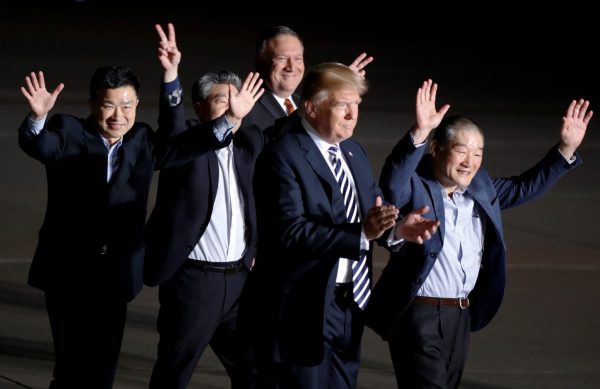This is the very beginning, not the end, of a long road that may one day lead to peace with a nuclear-free North Korea. Quite realistically, however, it may not, and US President Donald Trump’s administration may have actually increased the risk of large-scale conflict in the region.
North Korean leader Kim Jong-un’s policy of brinksmanship over the past few years produced a rare agreement in the United Nations Security Council that finally brought China and Russia together and led to the imposition of severe sanctions. It was the effect of sanctions on the North Korean economy, not a policy of brinkmanship, that pushed Kim to step over the Demilitarized Zone on 27 April. Now, both the United States and North Korea seek to cash in on the situation.
The US position for negotiations places precedence on a non-negotiable precondition of ‘complete, verifiable, and irreversible’ denuclearisation (CVID). The North has ‘given up’ its nuclear program one too many times before, going so far as blowing up the cooling tower of the plutonium production reactor at Yongbyon in June 2008 before resuming its nuclear program in April 2013. Only a CVID can guarantee that North Korea’s nuclear program will never be revived again.
Such a step could prove fatal for Kim. The historical records are instructive and North Koreans pay close attention to them. Back in the early 1990s, it was perhaps still possible to embrace a form of peacemaking idealism and give up nuclear weapons in exchange for promises of a bright and prosperous future. South Africa, Brazil and Ukraine all did it. Later, under different circumstances, Iraq and Libya followed. But it is 2018. Saddam Hussein and Muammar Gaddafi paid a hefty price for giving up their arms, as did Ukraine. In international politics talk is cheap, and the only insurance policy Kim has against a path similar to that of Libya or Ukraine is to keep his nuclear weapons.
The short-range missiles aimed at Seoul could provide the regime with adequate protection. But by giving up its nuclear weapons, the North will lose its ability to hold Japan and the US bases there and in Guam as collateral. Kim also worries about a potential military revolt — and control over the nuclear button acts as a necessary insurance policy against this scenario.
North Korea wants a peace treaty and guarantees that the US will not invade. Kim wants to bring some prosperity — whatever that might mean for him — to his people. A more realistic scenario is that the two sides will have to agree to begin incremental talks, even if the end goal is a ‘package deal’. There are two problems that beset this goal.
First, the all-at-once approach — ‘comprehensive denuclearisation’ — asks for too much. What North Korea understands as ‘comprehensive’ may be quite elastic. North Korea has already stated that it wants a nuclear-weapons-free zone on the peninsula, plus the removal of the US nuclear umbrella and its 29,000-strong military force from the Peninsula. For the United States, abandoning the Mutual Defense Treaty Agreement with South Korea may be a red line that even the impulsive Trump will not cross. It would leave the United States in an inferior position and it will send all the wrong signals to other states in the region.
The second problem comes from the fact that Trump agreed to meet with Kim without preliminary negotiations to determine the scope of the talks. Trump’s motives for leaning head first into this Korean adventure seem utterly domestic, as he tries to deliver a tangible foreign policy achievement before the US mid-term elections. It is obvious that Trump sees himself as an unconventional player who, much like his dealings in domestic politics, will be able to muddy the waters and pull out the big fish that no one has been able to before him.
Faced with the steep task of resolving the North Korean nuclear paradox, Trump will probably have to accept that there will be no ‘comprehensive and irreversible’ deal, only an incremental one. He will also probably return to the sanctions option.
But it is doubtful that new sanctions will have the same effect as the current ones. China would be in a position to blame Trump, and not Kim, for failed negotiations. South Korean President Moon Jae-in may also opt out. His preferred approach is an incremental one, a position most recently outlined by his adviser on unification Moon Chung-in.
For a US president under pressure domestically, this could necessitate escalating the confrontation. With his haste, Trump has already made three mistakes that damage the possibility for real success on the peninsula.
First, he has validated and legitimised Kim Jong-un as a major world leader to reckon with, regardless of his despicable human rights track record. Second, Trump has all but officially legitimised North Korea’s nuclear status. Third, Trump has now opened a new phase of peace negotiations, which inevitably include South Korea and China, turning the negotiation process into one that will no longer be either led by or controlled by the United States alone.
It seems as though current events are not ‘historic’ in any meaningful sense of the word after all. But they are certainly consequential, masking dark and gloomy prospects for the future of peace on the peninsula.
Liubomir Topaloff is Associate Professor of Politics at Meiji University.


After reading the article it’s obvious that the author gives more priority to defending various US’s interests and influence, perceived or real, beneficial or detrimental, over securing peace between the real neighbour stakeholders.